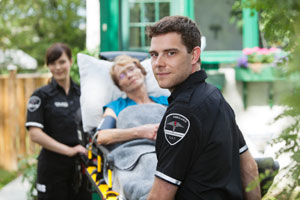Archive - Paramedical Occupations (NOC 3234)
If you are interested in working in the unit group of Paramedical Occupations in Canada, you will be pleased to know that the job outlook for your occupation in Canada is extremely positive.
You can use this overview of the Canadian employment prospects in your field to start planning your immigration and settlement in Canada.
Important statistics for this occupation:
- A recent growth in the demand for ambulance services makes job prospects in this field very good.
- Job opportunities will result mainly from employment increase, high turnover, and from jobs that will be vacated by ambulance attendants who are retiring.
- Almost all newcomers in this occupation now need to have completed training as ambulance attendants.
- The work in this occupation is very demanding both physically and psychologically and it requires extensive availability, because ambulance attendants often work evenings, nights and weekends.
- The median yearly income for workers in this unit group ranges from $33,000 to $85,000.
Duties for Paramedical Occupations
This unit group includes workers who administer pre-hospital emergency medical care to patients with injuries or medical illnesses and transport them to hospitals or other medical facilities for further medical care. They are employed by private ambulance services, hospitals, fire departments, government departments and agencies, manufacturing firms, mining companies and other private sector establishments. Paramedics who are supervisors are included in this unit group.
Description of Main Duties
Workers in this unit group perform some or all of the following duties:
- Assess extent of injuries or medical illnesses of trauma victims, patients with respiratory disease and stress, overdose and poisoning victims, industrial accident victims and other ill or injured individuals to determine emergency medical treatment
- Administer pre-hospital emergency care to patients such as oxygen therapy, cardiopulmonary resuscitation (CPR), spinal immobilization, bandaging and splinting
- Establish and maintain intravenous treatment (IV), apply adjunctive equipment for ventilation and circulation complications, administer medications and provide other advanced emergency treatment to patients
- Transport patients by air, land or water to hospital or other medical facility for further medical care
- Collaborate with ambulance dispatch centres, hospital staff, police, firefighters and family members to ensure relevant information is collected and proper treatment is administered
- Document and record nature of injuries and illnesses and treatment provided
- Assist hospital personnel with provision of medical treatment, if necessary
- Maintain ambulances and emergency care equipment and supplies
- May train and supervise other workers in this unit group
- May assist with triage of emergency patients.
Example job titles for workers in the unit group of Paramedical Occupations:
- Advanced care paramedic
- Ambulance attendant
- Critical care paramedic
- Emergency medical attendant (EMA)
- Emergency medical technician (EMT)
- Emergency medical technician, paramedic
- Emergency medical technologist – paramedic (EMT-P)
- Paramedic
- Primary care paramedic
- Supervisor, ambulance services
Find out about salary ranges for Senior Managers in different Canadian cities with our Canada Salary Calculator.
You can start looking for a job in Canada by using our Canada Job Search Tool.


